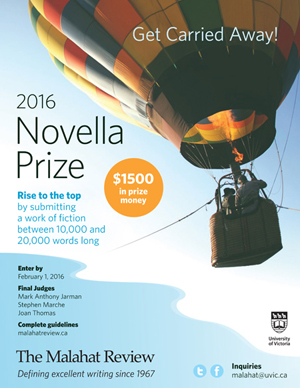
Shed the holiday fever and get writing!
Think of the novella as a short story fit for royalty. You'll win a cash prize of $1500, publication in the summer issue, and an interview to talk (and gloat) about your winning piece.
This year's contest judges are Mark Anthony Jarman, Stephen Marche, and Joan Thomas. Want to get inspired? Read interviews with each judge on our website.
Entry fees vary by location. All entrants will receive a one-year subscription to The Malahat Review.
Full contest guidelines available on the Malahat website.
 Malahat volunteer L'Amour Lisik talks with J.D. Zapf about “Median Love,” his nonfiction piece on the interconnectivity of modern love, set to be published in Issue #193.
Malahat volunteer L'Amour Lisik talks with J.D. Zapf about “Median Love,” his nonfiction piece on the interconnectivity of modern love, set to be published in Issue #193.
LL: This piece can be seen as a hybrid of creative nonfiction and fiction. Many writers dispute the limits of CNF and whether or not it can be mixed with fiction. Are there any sacred boundaries you keep to when writing CNF?
JZ: I want to say yes. I think that creative nonfiction is based supremely in fact; it does not intentionally mislead the reader. But if we look at “Median Love,” I have made people up. So, is that not a form of lying?
I’d argue it isn’t, because my intent is clear. The story is intentionally set up like fiction—it is overly specific yet has no real setting and therefore could be about people anywhere, and there is an omniscient narrator.
There are other little things that identify to the reader that this is not a typical creative nonfiction piece. For example, no one has a last name, and the stats often steer us away from seriousness. So I would say I haven’t broken my golden rule of misleading the reader.
Read the rest of J.D.'s interview on the Malahat website.
 Don't think you have the time to write? Ottawa writer and blogger rob mclennan dishes up hearty advice on snapping out of the writers' block mentality and strengthening your time-management regime.
Don't think you have the time to write? Ottawa writer and blogger rob mclennan dishes up hearty advice on snapping out of the writers' block mentality and strengthening your time-management regime.
Here's a sample of rob's publishing tip:
Attention is a muscle, one that requires development. I know writers that require a soundless space and enforced solitude; I acknowledge that for some this is the only way to proceed, but it all seems a bit precious, akin to suggesting that one can’t do any work until life is perfect and calm (which never happens, as you know). Silence and attention are not mutually exclusive. So you want to write?
Read the rest of rob's publishing tip on the Malahat website.